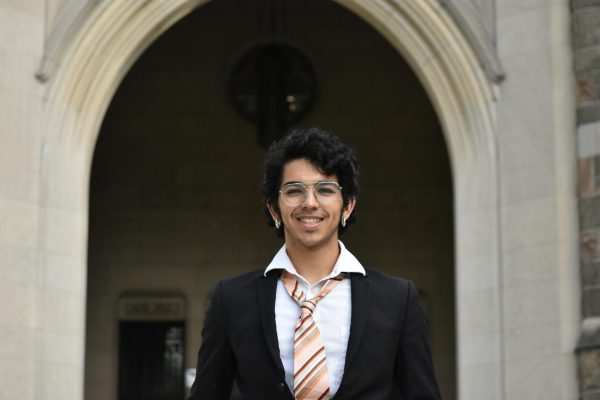Students and Faculty Draft Land Acknowledgment for Fordham
In a recent Student Life Committee meeting, professor Judith Jones discussed an ongoing project spearheaded by the Diversity Action Coalition (DAC) to help Fordham University acknowledge the Native American tribes that used to reside on the land the university is built upon.
The land acknowledgment project had humble origins years ago with the student DAC. The project’s initial version served as a first draft for the actual land acknowledgment, said Jones, a professor of philosophy at Fordham Rose Hill, in an interview with The Fordham Ram.
Since then, the initial draft has expanded into a full-blown project with expansive connections that proposes an extensive land acknowledgment from Fordham. One of the major forces behind the acknowledgment, aside from the DAC, is the Indigenous Working Group led by Rafael Zapata, chief diversity officer. The group is composed of representatives from other Fordham University groups, including the Faculty Senate Committee on Student Affairs, the Division of Student Affairs and the Office of Multicultural Affairs.
The students working on the project have done a fair share of community outreach to local Native American groups, said Jones. Most notably, the students, along with Jones, held a conversation with the American Indian Law Alliance and a representative from the Haudenosaunee Confederacy (also known as the League of Five Nations or the Iroquois Confederacy).
“The status of Indigenous Peoples is an important dimension of the work of the United Nations, and so these efforts of ours have broad implications and are situated in a truly global conversation about justice and human flourishing,” said Jones.
Moving forward with the land acknowledgment will be essential to helping the university learn from Native American groups and institutions, said Jones.
Fordham has done work in the past to help foster genuine conversations dealing with sensitive and complex Native American histories. For example, the Office of Multicultural Affairs has continued to invite representatives from many local native tribes. These efforts have helped share their histories and experiences with the Fordham community, creating an environment that directly responds to and recognizes native history. Still, Jones said there are steps that the university can take to become more reflective in its relationships with these tribes.
Many of Fordham’s values already align with the values of Native American groups that the group has reached out to. Environmental integrity, social justice and sacred practices are just a few examples of these shared values, said Jones.
“Fordham has much to offer in the way of shared vision, shared educational opportunities, shared service engagements and activism, and more, though of course, we will be seeking the guidance of the Indigenous peoples themselves about what Fordham can do to benefit them as we work in collaboration,” she said.
These initiatives, including the land acknowledgment project, have been regarded as important steps towards further diversity and inclusion by not only the Office of Multicultural Affairs and the Chief Diversity Officer but the Indigenous Working Group as a whole, said Jones.
The project can be vital in helping the university and its community switch into the kind of relational thinking that is going to be necessary for navigating a challenging future.
Efforts of reaching out to the native tribes to help bring their voices to campus helps Fordham emphasize the histories that the university has been a part of rather than just a singular history that began with the foundation of the university, according to Jones. This kind of reflection is necessary in order to fully understand the deeply complex voices of Fordham’s diverse community.
As a student-led project, the evolution of the land acknowledgment proposal from a draft of an acknowledgment to a full-blown project with a working group and faculty involvement is an example of the power of student commitment. “The students who have worked so persistently to bring a mature proposal to the university have a lot to be proud of, and I am honored to work with them,” said Jones.

Sebastian Diaz is a senior from Chapel Hill, N. C. who is double majoring in journalism and film. After starting as a news reporter for The Fordham Ram...







































































































































































































